Mastering the Employee Value Proposition: Attract, Engage & Retain Top Talent
Discover how to craft a powerful employee value proposition that aligns with modern workforce needs, boosts retention, and strengthens your employer brand.
On this page
- What is employee value proposition (EVP)?
- Importance of employee value proposition
- Developing an employee value proposition
- Impact of pandemic on employee value proposition
- Rethinking your employee value proposition in today’s talent market
- Examples of companies with best employee value proposition
- How Empuls strengthens your EVP
- Custom EVP framework powered by Empuls
- Key takeaways
- FAQs
Every year, companies in the USA vie to get on a prestigious list that has nothing to do with their products, services, or customers. And yet, getting on the recent list of Top 100 Best Places to Work is a signature achievement and has everything to do with the success of these companies.
Significantly, companies on this list are assured that they will be able to recruit the best of the best because employees are increasingly discerning “buyers” in the employment marketplace.
According to a recent McKinsey study, word-of-mouth positively impacts the potential client by 20% to 50% for all purchase choices, and 50% to 80% of word-of-mouth is based on personal experience with a product or service, making the matter of EVP one of the most sought-for elements in any organization.
To corroborate this study, Gartner revealed that organizations that effectively focus on delivering their EVP can positively notice a decrease in turnover by just under 70% and increase a new hire commitment by nearly 30%. This blog will focus on employee value proposition, its importance, and various nuances.
What is employee value proposition (EVP)?
The EVP synchronizes the organization’s expectations of employee skills, capabilities, and experience; with the benefits that the employees derive from such work.
Simply put, an EVP is who you are as a company, and what you offer. It is the foundation for an organization’s reputation as an optimal place of work. It is what brings the best candidates into the organization and ensures those same individuals stay.
Importance of employee value proposition
Businesses can’t grow without a talented workforce. Companies with a clear and compelling EVP outperform their competitors because they attract and retain a superior workforce. The data on this is clear.
A well-designed and differentiated EVP is 5X times more likely to have highly engaged employees. It is also 2X times more likely to produce financial performance significantly above peers.
And yet, only 23% of executives say that their companies are excellent at aligning employees' goals with corporate purposes and as many as 33% of global companies don’t have or communicate a clear employee value proposition (Source: SHRM).
As the global economy recovers from the pandemic, and demand accelerates, there is a major competition underway for top-tier employees. With more remote working options now a post-COVID-19 norm, the landscape for company recruitment has also changed.
In this environment:
↠ 57% of recruiters say their top challenge is differentiating their company from the competition.
↠ Gartner notes that through 2023, 70% of companies who do not have a defined, compelling, and well-articulated EVP will be unable to hire and retain critical talent to meet their needs.
↠ Organizations with excellent EVPs experience a markedly lower voluntary turnover, which in turn lowers employment costs.
According to Gartner, organizations can reach 50% deeper into the labor market when candidates view their EVP as attractive. An effective EVP can also attract passive candidates, re-engages your current workforce, provide vital management and strategy alignment, and revitalize talent recruitment efforts.
Developing an employee value proposition
Building a strong employee value proposition needs to be a deliberate and thoughtful process and be well resourced. Successful organizations know that a happy and motivated workforce leads to higher profitability.
The goal should be to create a sustainable EVP that is effective in any economic environment but also allows for scalability in a downturn - like the one we have experienced in 2020. Here is a recommended EVP lifecycle:
- Assess phase: In the first phase, assess, one creates a checklist of all the EVP components that are currently being offered.
- Research phase: Research requires collecting feedback from incoming and outgoing employees and cataloging what is working and what is not meeting employee expectations.
- Discuss phase: In the Discuss phase, employee populations and roles are segmented to find out what is most important to each group. Everyone does not have the same drivers and motivation. Think outside the box and include new benefits like the ones from Empuls.
- Build phase: In Build, use data from the previous three phases to define the characteristics of the new EVP.
- Executive phase: In the Execute phase, market, and promote the EVP through internal and external channels. Train and reward managers to not only know EVP attributes but to “live” them - thus setting an example for all their employees.
- Review phase: The Review phase requires an objective review of whether the expected EVP metrics (like hiring statistics) are being met. If needed, recalibrate, and change attributes to deliver a more effective EVP. No EVP can remain static for long.
Impact of pandemic on employee value proposition
As a result of the pandemic, remote work options have exploded, and candidates can now find jobs that give them better flexibility and more work-life balance. More than half (53%) of companies recently surveyed said that they are altering their EVPs to promote more work-life balance and wellness.
Conversely, some of the benefits that companies offer—gym memberships and opulent office spaces, to name a few—may no longer have the same value. Forbes adds that only 10% of employees desire to return to their workplaces full-time. Employee health and safety have become far more important.
Employees are also seeking assurances that companies have the financial wherewithal to survive severe downturns like the COVID-19 crisis.
The shift in how we work, where we work, and what attributes are important - has undergone a sea change post-pandemic. If you have not already done so, it is time to consider a thorough review of the EVP so that your recruiters have the right answers for prospective candidates - responses that resonate with the new reality of the workplace.
In such a time, what one can do is just rethink the method of building the EVP.
Rethinking your employee value proposition in today’s talent market
In the wake of the Great Resignation and an increasingly competitive labor market, organizations are facing intensified challenges in attracting and retaining top talent. Traditional approaches to engaging employees are no longer sufficient. In its article “Rethink Your Employee Value Proposition,” Harvard Business Review offers a timely perspective on how businesses should evolve their strategies to remain competitive.
1. Why traditional approaches to EVP are no longer effective
Many companies attempt to respond to employee dissatisfaction by surveying staff about what they want—be it better pay, more flexibility, or wellness perks—and then try to fulfill those demands. However, HBR points out that this reactive method often falls short. It treats symptoms without addressing the root causes of disengagement and turnover.
Employees today are seeking not just benefits, but meaning, belonging, and alignment with their personal values. This shift calls for a more strategic and holistic view of the employee value proposition—one that goes beyond surface-level perks.
2. Introduce a more strategic employee value proposition framework
To truly meet the needs of the modern workforce, HBR recommends rethinking the employee value proposition framework from the ground up. This involves designing an EVP framework that is deeply aligned with the organization’s purpose, culture, and the lived experiences of employees. Key elements of a modern EVP include:
- Purpose-driven work: Employees want to contribute to something meaningful.
- Opportunities for growth: Career development and continuous learning are top priorities.
- Authentic culture: Inclusion, equity, and transparency are essential.
- Flexibility and well-being: Work-life balance and mental health support are expected, not optional.
By focusing on these pillars, companies can create a best employee value proposition that resonates on a deeper level and fosters long-term loyalty.
3. Build a differentiated EVP in a competitive labor market
In a talent market where top candidates have more options than ever, differentiation is key. HBR emphasizes that your EVP should reflect what makes your organization unique—not just what’s trending. This means aligning your internal practices with external messaging, and ensuring that promises made to employees are consistently kept. Organizations that get their EVP right are better positioned to:
- Attract high-quality candidates
- Reduce employee turnover
- Increase engagement and productivity
- Strengthen their employer brand
Examples of companies with best employee value proposition
Here is how the famous companies like Unilever, PwC, Nasa and Deloitte are doing employee value proposition right.
1. Unilever
"Unilever is the place where you can bring your purpose to life through the work that you do, creating a better business and a better world. You will work with brands that are loved and improve the lives of our consumers and the communities around us. At the heart of our value proposition is that we build leaders. We develop leaders for Unilever, and Unilever leaders go on to be leaders elsewhere in the world."
2. PwC
"From developing leaders at every level, to digital training to help you embrace the innovative technology of tomorrow, PwC provides you with support to help you develop your career and build relationships with people from diverse backgrounds and across multiple industries. Are you ready to make an impact?"
3. NASA
"Explore the Extraordinary, Every Day. NASA is more than astronauts. We are scientists, engineers, IT specialists, human resources specialists, accountants, writers, technicians, and many other kinds of people working together to break barriers to achieve the seemingly impossible."
4. Deloitte
"Our people are our brand. We have a continuous learning environment. Creativity is encouraged; innovation is expected. We believe teamwork beats individual brilliance every time. Our leaders know they are not the sole source of wisdom – they are students and teachers simultaneously. We are redefining the way professional services are experienced for our clients and our people."
How Empuls strengthens your EVP
Empuls provides an AI-powered engagement platform that directly supports every phase of the EVP lifecycle—from listening to employees and rewarding them meaningfully to ensuring alignment and well-being.
1. Attracting & retaining top talent
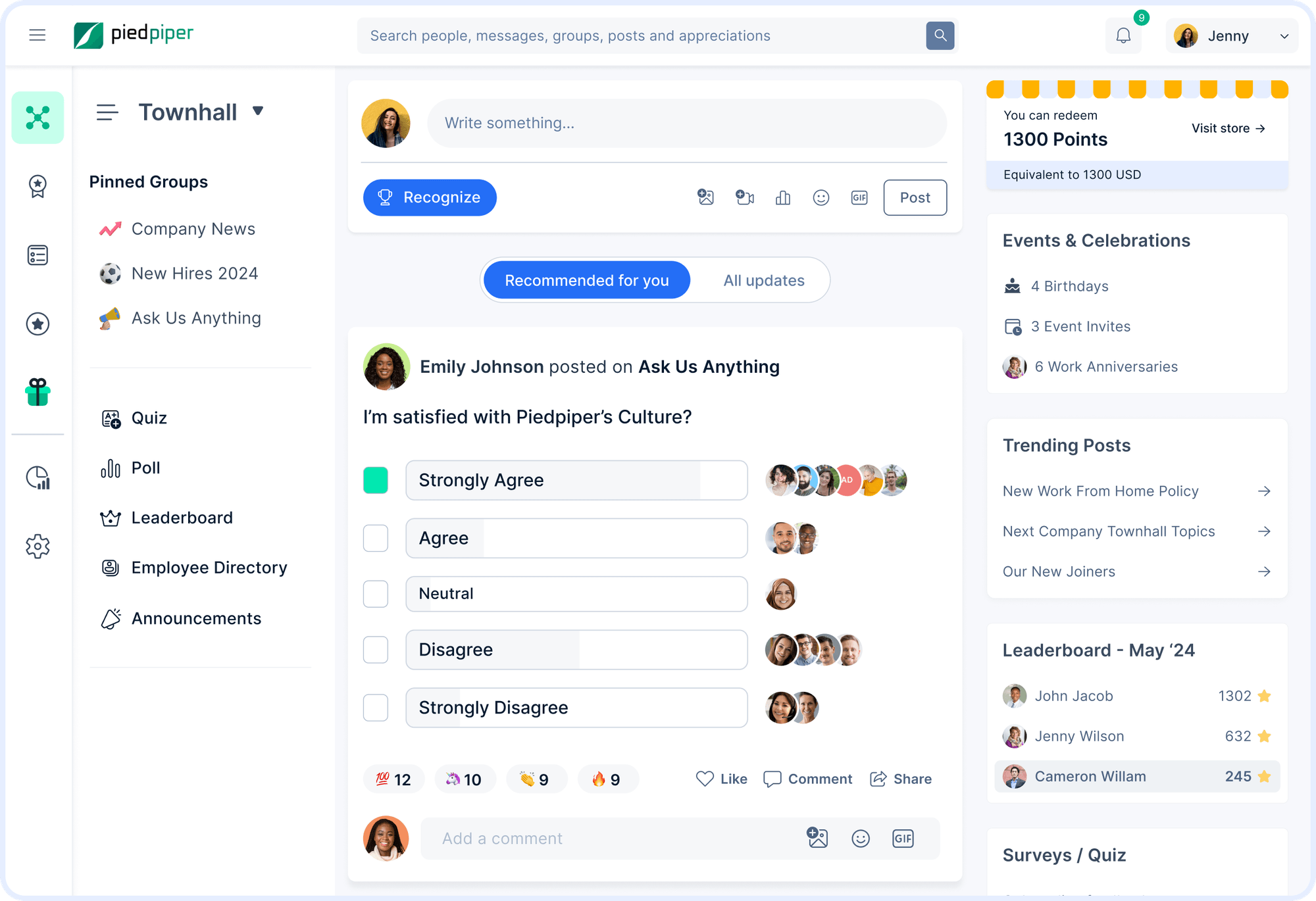
- Multi-lingual & multi-currency support ensures global inclusivity.
- White-labeled experience to reflect your employer brand.
- Integrated with HRMS & MS Teams to ensure visibility and seamless onboarding.
2. Delivering purpose & alignment
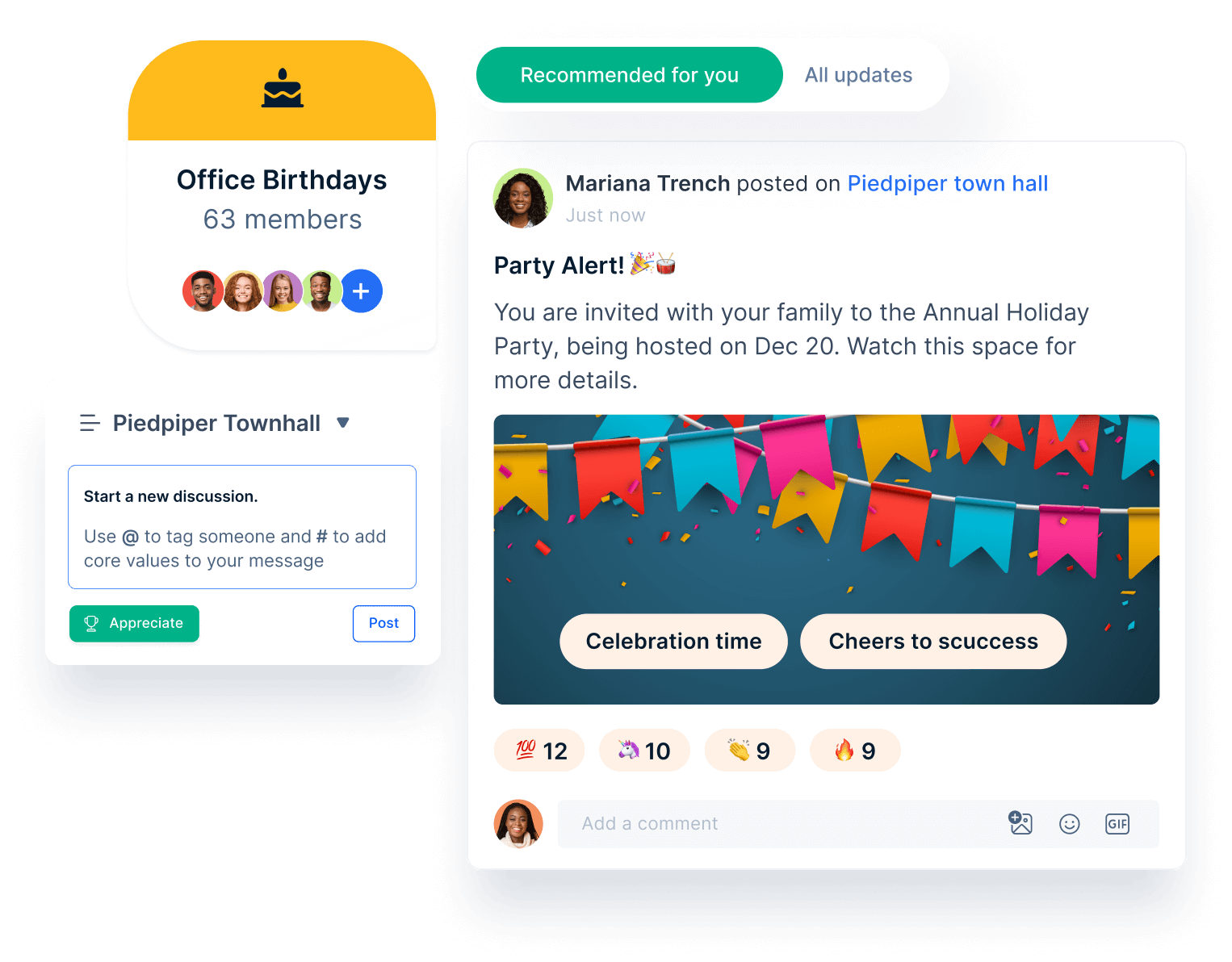
Social intranet and community groups connect employees to the company’s mission and each other. Interactive town halls, announcements, and AMAs promote transparency and shared goals.
3. Recognition, rewards, and culture building
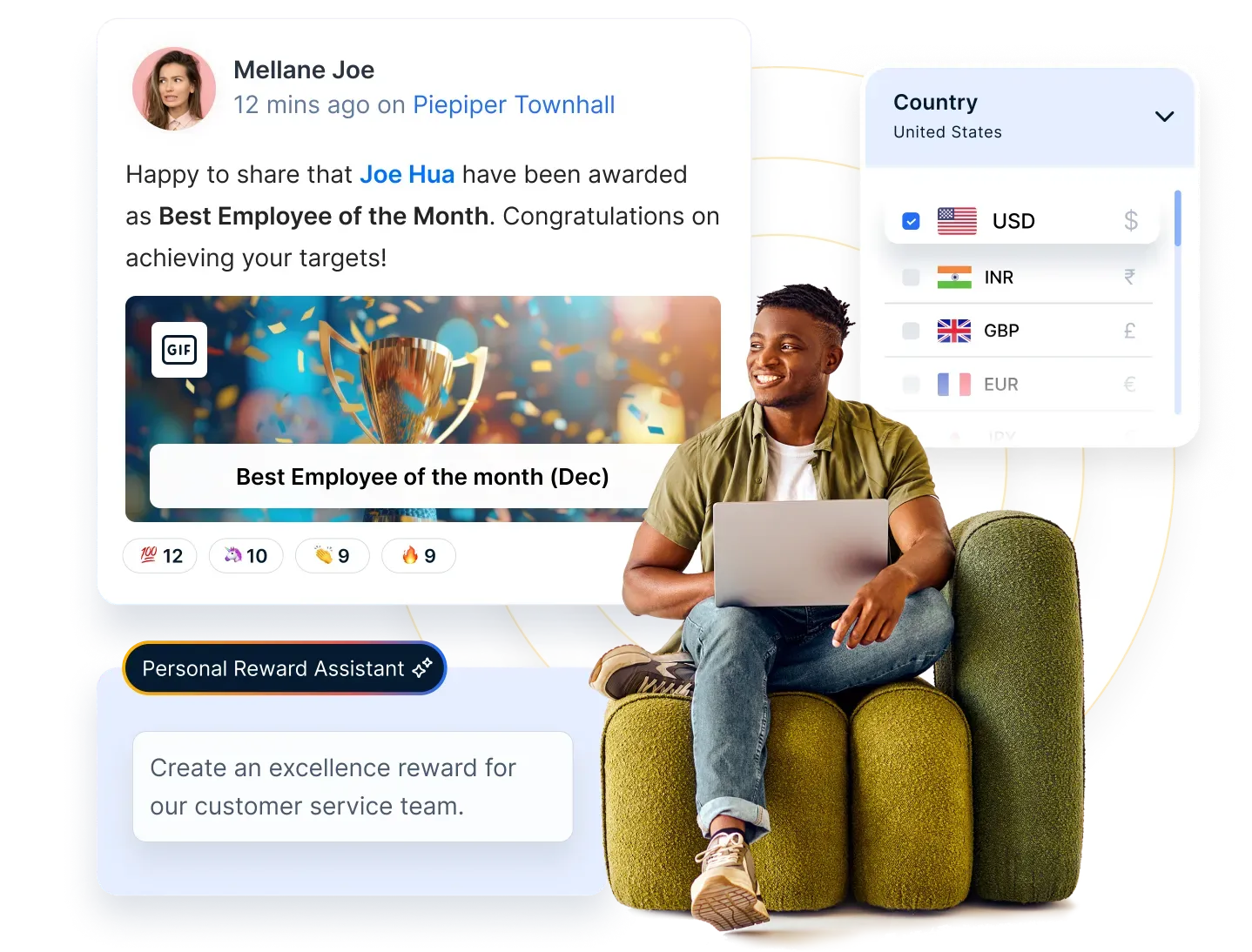
Empuls supports peer-to-peer, jury-based, milestone, and spot awards to recognize contributions in real time. AI-powered nudges from Empuls’ bot “Em” encourage timely recognition and equitable engagement. Celebrations for birthdays, service anniversaries, and achievements make employees feel seen and valued.
4. Listening & continuous feedback
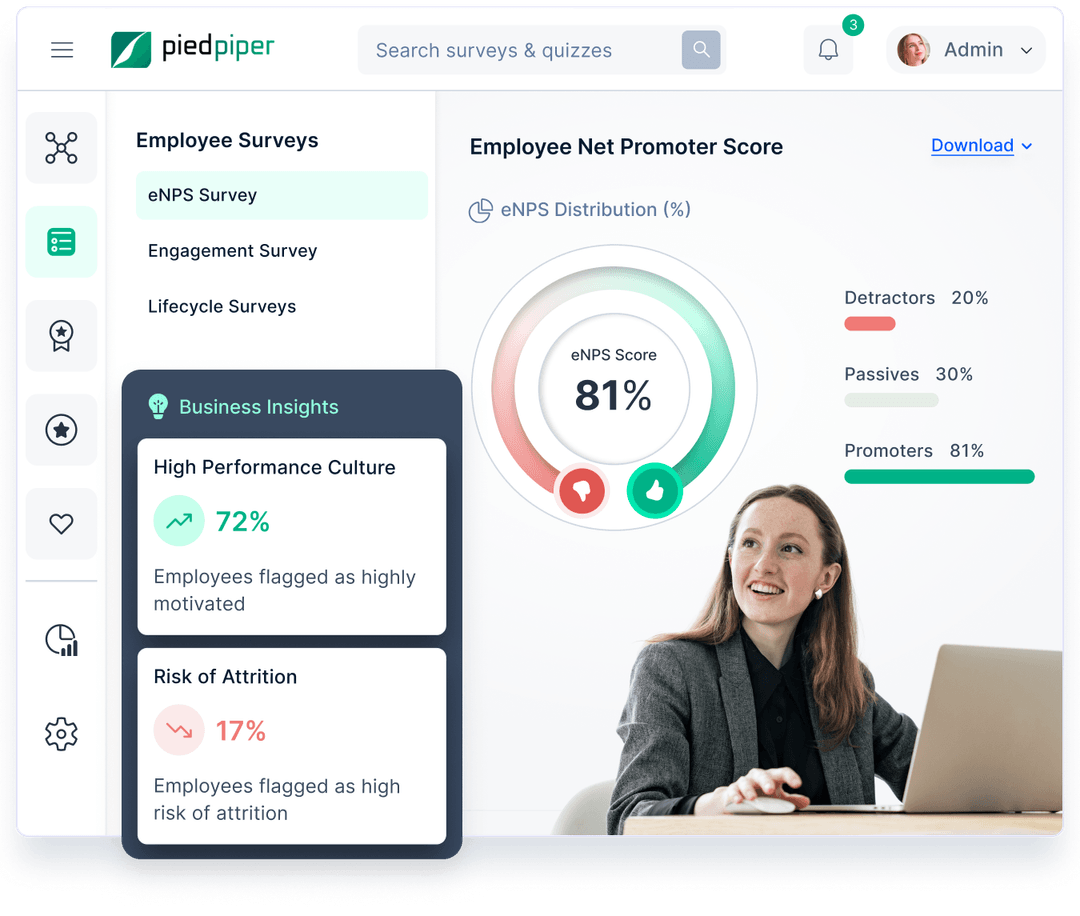
Pulse, eNPS, and lifecycle surveys collect feedback throughout the employee journey. 360° feedback and people analytics guide strategic improvements to the workplace experience.
5. Perks, benefits & wellbeing
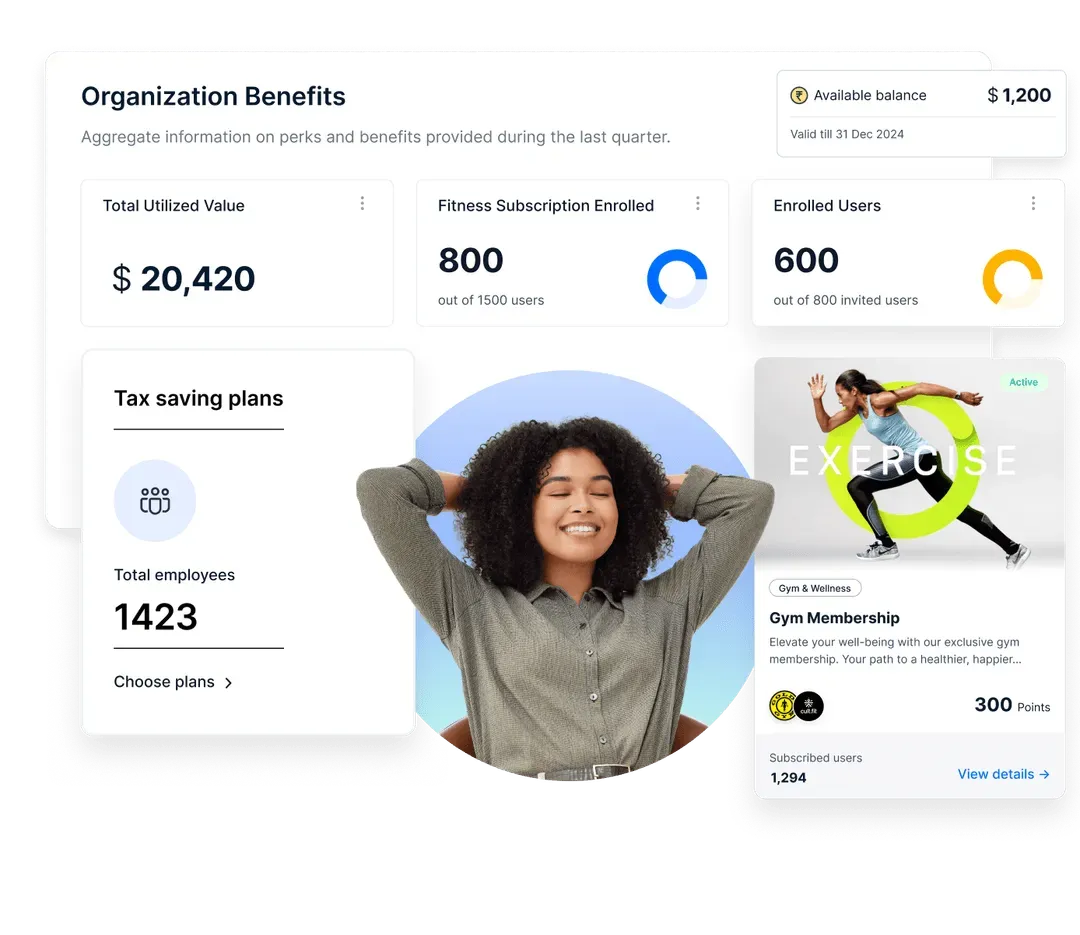
Comprehensive perks & discounts across 6,000+ brands in 50+ countries to extend employees' purchasing power. Flexible fringe benefits like wellness, remote work, education, and family care through Lifestyle Spending Accounts (LSA). Salary advance features are for financial well-being without credit checks or costs to the company.
The modern EVP is not just about salary or perks — it's about meaning, alignment, and employee experience. Platforms like Empuls operationalize and elevate EVP by enabling companies to:
- ✅ Listen actively
- ✅ Recognize genuinely
- ✅ Reward equitably
- ✅ Engage holistically
- ✅ Promote well-being globally
By partnering with Empuls, you position your organization as a top employer that cares, listens, and acts — making your EVP a statement and a lived reality. In case you don’t know how to implement the plan with Empuls, here’s how to do it strategically.
Custom EVP framework powered by Empuls
Following is how you implement the EVP framework step-by-step.
1. Assess – Audit your current EVP offering
Start by identifying what's already working and where gaps exist.
-> Use Empuls' survey templates (e.g., pulse, eNPS, lifecycle) to gather baseline data from employees.
-> Analyze feedback using Empuls People Analytics to assess satisfaction across benefits, communication, recognition, and well-being.
2. Research – Understand employee expectations
Dig deeper into employee experiences and preferences.
-> Run custom EX surveys to explore employee needs by demographic or lifecycle stage.
-> Segment responses by team, geography, or role using Empuls' dashboard to identify patterns.
3. Discuss – Segment and prioritize
Tailor EVP components to different employee segments (e.g., Gen Z, remote workers, parents, managers).
-> Use community groups to open up discussion threads and conduct informal polls.
-> Create Wishboards for ideas around benefits and rewards.
4. Build – Define and document your EVP pillars
Create a solid value proposition that addresses:
- Purpose
- Growth
- Culture
- Flexibility
- Well-being
-> Reflect these EVP pillars within the platform's white-labeled frontend and social intranet.
-> Align reward badges and communication campaigns to your core values and EVP narrative.
5. Execute – Bring EVP to life internally & externally
Time to activate and market your EVP!
-> Launch an internal EVP campaign via townhalls, video updates, and leader messages.
-> Automate recognition and milestone celebrations to reinforce values (birthdays, service awards, achievements).
-> Use social intranet to publish success stories and employee spotlights.
📊 6. Review & evolve – Track metrics and continuously improve
Measure effectiveness and optimize based on real-time data.
-> Monitor engagement, recognition frequency, and perk usage via Em's analytics and dashboards.
-> Run post-implementation surveys and compare new eNPS, retention rates, and feedback sentiment.
Example EVP Message (for employer branding)
“At [Your Company Name], we’re more than just a workplace. We’re a community driven by purpose, fueled by recognition, and powered by people. Through Empuls, we ensure our employees are heard, valued, and supported — with meaningful rewards, personalized benefits, and a culture of continuous growth.”
Here’s a custom EVP rollout timeline in a structured table format, aligned with the 6-phase framework and Empuls capabilities:
Key takeaways
Today, the prospective employee is discerning and “shops” different employers to find the right alignment and fit for their own passion, role, culture, and life.
To stand out in this crowded field, employers must have a strong EVP to set themselves apart and offer prospective employees a great experience. Organizations that do this successfully will be able to attract and retain top talent, and hence will be better placed to be successful.
FAQs
1. What are the 5 pillars of EVP (Employee Value Proposition)?
- Compensation – Salary, bonuses, and financial rewards.
- Benefits – Health insurance, retirement plans, paid time off, etc.
- Career – Growth opportunities, training, promotions.
- Work Environment – Company culture, leadership, work-life balance.
- Purpose – Mission, values, and meaningful work.
2. What is the EVP strategy?
An EVP strategy defines how a company attracts, engages, and retains talent by clearly communicating what employees get in return for their skills and contributions. It aligns employee needs with business goals to create a compelling and consistent message.
3. What is an example of EVP?
Example: Salesforce promotes its EVP with a focus on “Ohana culture”—offering competitive pay, inclusive values, career development, community impact, and employee well-being.


















